POLICY PAPERS
Our policy papers codify the learning from our community of practice and offer recommendations
to Chiefs as they shape the future of education in their states and districts.
to Chiefs as they shape the future of education in their states and districts.

May 14, 2020
THE RETURN
How Should Education Leaders Prepare for Reentry and Beyond?
The COVID-19 crisis has brought school closures to every state in the country; district, charter, and private schools alike have scrambled to provide remote learning in short order. While the current restrictions on student learning will not last forever, the consequences of the crisis on students’ academic progress—let alone on their and their families’ economic and emotional wellbeing—are likely to persist well into the future. How can school systems prepare for what will be anything but business as usual?

March 2, 2020
LEADING CHANGE IN LOUISIANA
How Louisiana Is Empowering Teachers to Implement an Aligned Academic Vision
Research shows that teachers are most effective when they have access to a high-quality curriculum, ongoing professional development that helps them use that curriculum well, and student data from standards-aligned assessments. This coherent academic vision of aligned curriculum, assessments, and professional learning is focused on providing every educator with the tools and resources to meet the needs of all students.

November 1, 2019
Curriculum Implementation Guide
This document is a road map for establishing a strong academic system of standards and instructional materials, professional learning, and assessment.

September 30, 2019
LEADING CHANGE IN TEXAS
How Members of Chiefs for Change are Helping to Build a System of Great Schools
In recent years, Texas has introduced a number of cutting-edge and comprehensive reforms aimed at improving underperforming schools. One important initiative is the Texas Education Agency’s (TEA) System of Great Schools (SGS). This report outlines the SGS approach, which is designed to foster systemic change at the district level by creating more high-quality school options for families. The report also explains how members of Chiefs for Change are participating in the SGS and provides recommendations for other states interested in implementing the model.

April 30, 2019
CHOOSING WISELY
How States Can Help Districts Adopt High-Quality Instructional Materials
The Chiefs for Change report, "Choosing Wisely: How States Can Help Districts Adopt High-Quality Instructional Materials," describes reasons why states with curriculum oversight often fail to prevent the use of poor materials. The report also outlines recommendations that states can follow to promote the use of excellent curriculum and related professional learning.

April 9, 2019
BREAKING THROUGH
Shattering the Glass Ceiling for Women Leaders
While Chiefs for Change believes that embracing all dimensions of diversity is vital, this brief focuses on the inequity among women in education leadership roles in districts and states. Join Chiefs for Change in this work by sharing the report, and by taking action to address this inequity. Together, we can ensure that the next generation’s great women leaders end up where they should be: at the top.

February 21, 2019
HONORING ORIGINS AND HELPING STUDENTS SUCCEED
The Case for Cultural Relevance in High-Quality Instructional Materials
Based in part on a research analysis conducted by the Johns Hopkins Institute for Education Policy, this report provides an overview of the emerging research base on cultural relevance and describes how Chiefs for Change members are transitioning to rigorous instructional materials that honor the origins and experiences of their diverse students. The report offers recommendations for state and district leaders and explains that quality and relevance are dual imperatives of an equity agenda as it relates to teaching and learning.

January 28, 2019
LET’S GET TO WORK
Learning From Success in Career and Technical Education
This report seeks to help state and district leaders throughout the country serve students better through practical, actionable strategies and policies to strengthen and modernize CTE (career and technical education). These recommendations reflect promising practices from several CFC members—along with a review of the existing research on CTE. This report focuses particularly on progress in improving CTE programs in Tennessee, Nevada, Denver, and San Antonio—all models of innovation, each with different lessons to offer.
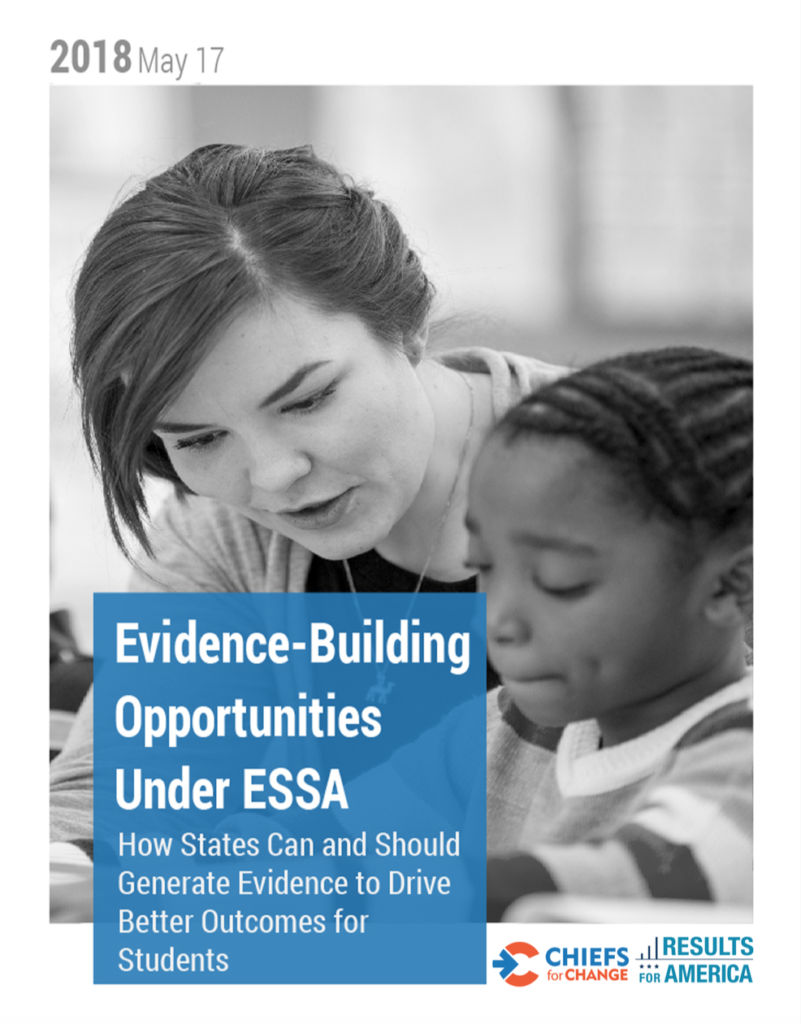
May 17, 2018
EVIDENCE-BUILDING OPPORTUNITIES UNDER ESSA
How States Can and Should Generate Evidence to Drive Better Outcomes for Students
"Evidence-Building Opportunities Under ESSA," issued in collaboration with Results for America, highlights ways that state education Chiefs have expanded research efforts to study the impact of programs and initiatives focused on boosting student achievement. The report serves as a guide for states and districts. It outlines evidence provisions in the Every Student Succeeds Act (ESSA) and describes a range of policies, practices, tools, and partnerships states have created to better understand what works to help students learn.

April 3, 2018
LEADERSHIP MATTERS
Investing in Sustained School-Systems Leadership
The call to action is straightforward: At every level, policy makers, stakeholders, and current education leaders can serve students better by investing in and drawing from new and stronger career pathways, superintendent-development programs, and coaching trees within districts and state education agencies. America’s public education system needs a stronger bench of courageous and effective systems leaders. But that won’t happen until we prioritize diverse education system leadership and develop it.

February 12, 2018
THE NETWORK EFFECT
Harnessing the Power of Teacher Leadership Networks to Sustain Progress in Tennessee
Under the sustained leadership of two Chiefs for Change Members, Commissioners Kevin Huffman and Candice McQueen, Tennessee has made truly impressive progress in student achievement over the better part of the past decade which is a testament to the vision for and dedication to their teacher empowerment work. The Tennessee Department of Education made it a priority to incorporate teacher voice into a variety of initiatives aimed at improving schools and the teaching practice. The statewide efforts, which provide support for district-led programs, have empowered teachers to take ownership of policy, curriculum, technology use, and data through a “network of networks.” At a time when the state was working to improve standards and raise expectations across the board, teacher leadership was key to successfully developing, launching, and sustaining reform efforts.

January 31, 2018
THE HIDDEN EQUATION IN SCHOOL IMPROVEMENT
Lessons Learned About Governance Based Strategies
This report is about the principles that underlie that promise, and what bold leaders can do to accelerate that kind of change. The result of such thoughtful, coordinated efforts has been improvements where they matter most — in outcomes for kids. Chiefs for Change members are committed to a core set of beliefs and share a vision that all American children can lead fulfilling, self-determined lives as adults. When it comes to school improvement, they are leveraging governance-based measures in particular to develop strategies in service of this vision.

December 11, 2017
SUSTAINED, BOLD REFORM
Investing in Teacher Leadership in New Mexico
Sustained, Bold Reform: Investing in Teacher Leadership in New Mexico draws lessons from the distinct approach used by New Mexico Education Secretary Hanna Skandera and her successor Christopher Ruszkowski, both Chiefs for Change members, to modernize and elevate the teaching profession, providing an in-depth analysis of the state’s successful model for teacher leadership. With the state agency as a case study, this brief lends an insider view of the structures, systems, metrics, policies, and programs developed in the Land of Enchantment to empower teachers as leaders, advocates, and trusted partners in school and system improvement. Bold leadership, sustained over time – and the coaching trees that help to ensure sustained leadership – matter.

August 8, 2017
HIDING IN PLAIN SIGHT
Leveraging Curriculum to Improve Student Learning
A relatively nascent but powerful body of research suggests that content-rich, standards-aligned, and high-quality curricula exert a powerful influence on student achievement. There is also early evidence that switching to a high-quality curriculum may be a more cost-effective way to raise student achievement than several other school-level interventions. Leading states and districts – from New York to Louisiana to Washington, D.C. – are showing how smart strategies can be used to ensure that high-quality standards are matched with high-quality instructional materials, leading to strong student outcomes – without trampling on local control of education.

June 5, 2017
THE CASE FOR TEACHER LEADERSHIP
Elevating the Teaching Profession and Sustaining Equity and Excellence
School systems throughout the country are working to establish avenues for teacher leadership, but often lack powerful models to guide action. This policy brief from Chiefs for Change offers a view into some of the most promising efforts, and perspectives on how others can learn from those models. "The Case for Teacher Leadership" draws lessons from distinct approaches by Chiefs for Change members — Louisiana, New Mexico, and Tennessee — to elevate the teaching profession. It also lays out a five-stage continuum for meaningful teacher leader engagement.

April 4, 2017
EVIDENCE & FUNDING
Connecting the Dots
The Every Student Succeeds Act (ESSA) provides states new freedoms to leverage federal programs toward a wide range of possibilities. But what does it look like to use that freedom in the most strategic and effective ways? State Chiefs are developing bold strategies to take advantage of the additional flexibility to use federal funding in more innovative and evidence-based ways. Leveraging this flexibility can be a powerful tool for leaders to meaningfully influence the work of schools and outcomes for students. Nationally, over $16 billion is currently spent each year on the two largest federal Title programs in ESSA – Title I and Title II – and ESSA provides new opportunities for states to invest these funds in smarter, forward-thinking ways.

February 9, 2017
LEVERAGING INSTRUCTIONAL CHOICE UNDER ESSA
State Leadership on Direct Student Services
The Every Student Succeeds Act (ESSA) includes a provision championed by Chiefs for Change that will address the access gaps that exist in far too many of our highest need schools and provide students and families with meaningful instructional choices to support their learning. The provision – Direct Student Services (DSS) – allows states to set aside 3% of Title I funding and award this to districts with a high number of schools identified for improvement that are committed to offering more meaningful learning opportunities, activities, courses, and services not otherwise available to students.

February 7, 2017
FROM FINANCIAL TRANSPARENCY TO EQUITY: PART 1
Using ESSA to Advance Equity & Excellence
When Congress passed ESSA in 2015, it created a requirement that states report per-pupil spending levels at both the district and individual school levels, disaggregating federal, state, and local funds, as well as personnel and non-personnel expenditures. In the coming months of 2017, states have an opportunity to demonstrate leadership and a commitment to equity and excellence by not just complying with the requirement, but by designing and implementing a methodology that will allow districts to use data to make strategic and smart decisions for the equitable distribution of resources.
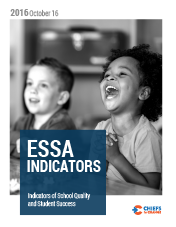
October 16, 2016
ESSA INDICATORS
Indicators of School Quality and Student Success
Before considering new indicators, states will want to critically examine the quality and validity of all the existing indicators in their systems, particularly with regard to any performance targets in their annual growth indicators and so as to ensure that these are consistent with their ESSA-required state-wide interim and longterm academic achievement targets. Nevertheless, ESSA clearly also requires at least one indicator of school quality as part of a state’s accountability system, thus providing an important opportunity to focus on new indicators that could contribute to continuous improvement in educational outcomes.
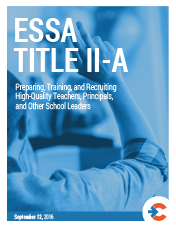
September 12, 2016
ESSA TITLE II-A
Preparing, Training, and Recruiting High-Quality Teachers, Principals, and Other School Leaders
The Title II program under ESSA continues to focus on raising student achievement by improving the quality of teachers, principals, and other school leaders, and affords significant flexibility for states and districts to carry out a wide variety of activities, consistent with their specific needs. These opportunities are significant, as in 2016 $2.34 billion was appropriated for Title II. This brief provides specific pathways for states and districts to develop and implement programming in a strategic and collaborative manner in order to better prepare, develop, recruit, retain, and ensure equitable access to our strongest educators.

July 7, 2016
ESSA & EVIDENCE
Why It Matters
ESSA incentivizes states to use evidence-based programs and interventions in districts and schools. Doing so will lead to stronger student outcomes at reasonable cost; not doing so throws dollars after uncertain or even negative outcomes for students and schools. The purpose of this policy brief is to suggest how state Chiefs might navigate ESSA’s evidence-based provisions effectively. We clarify what ESSA requires in terms of the use of evidence-based policies, what each standard of evidence means, and how state Chiefs might create a climate in which research-based policies become the default choice for district interventions.
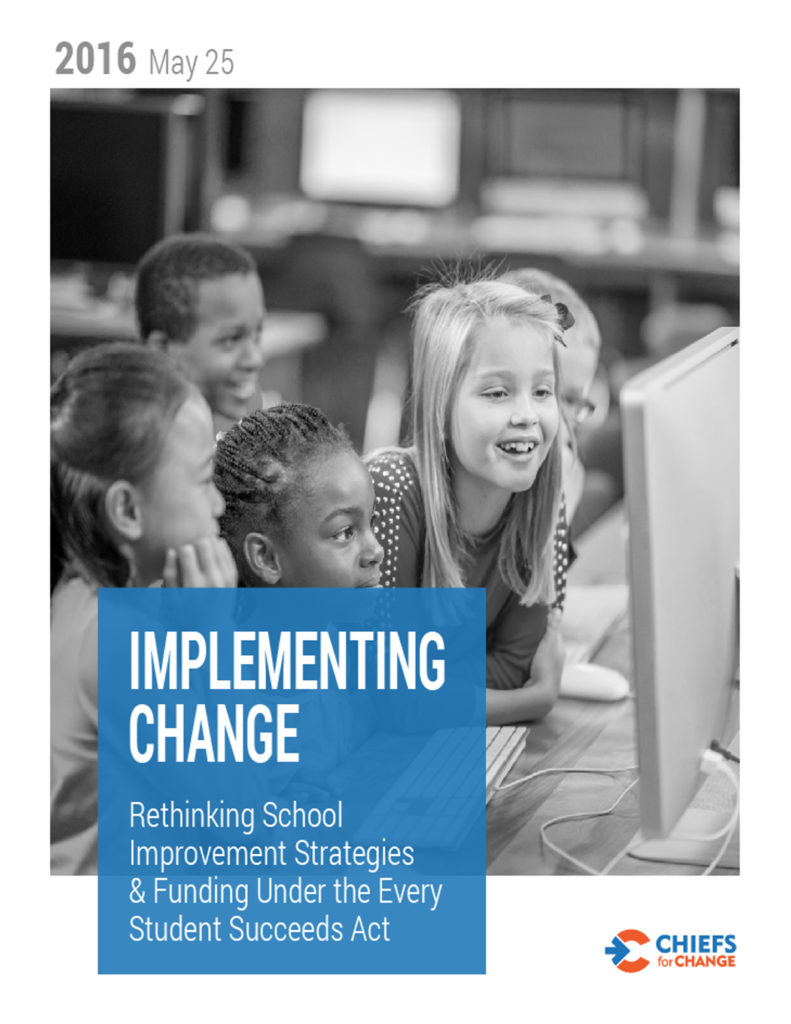
May 25, 2016
IMPLEMENTING CHANGE
Rethinking School Improvement Strategies and Funding Under the Every Student Succeeds Act
The Every Student Succeeds Act (ESSA) requires state education agencies (SEAs) to set aside 7% of their Title I funding in order to turn around struggling schools identified by states under their accountability systems. Nationwide, this translates to over $1 billion annually. Under ESSA, states have far greater flexibility to approach school improvement in fundamentally stronger ways, shifting decision-making from the federal government to SEAs and local education agencies (LEAs). This paper provides guidance for SEAs committed to advancing this newfound local flexibility and innovation, while also incentivizing LEAs to identify and implement evidence-based school improvement strategies and holding them accountable for results.
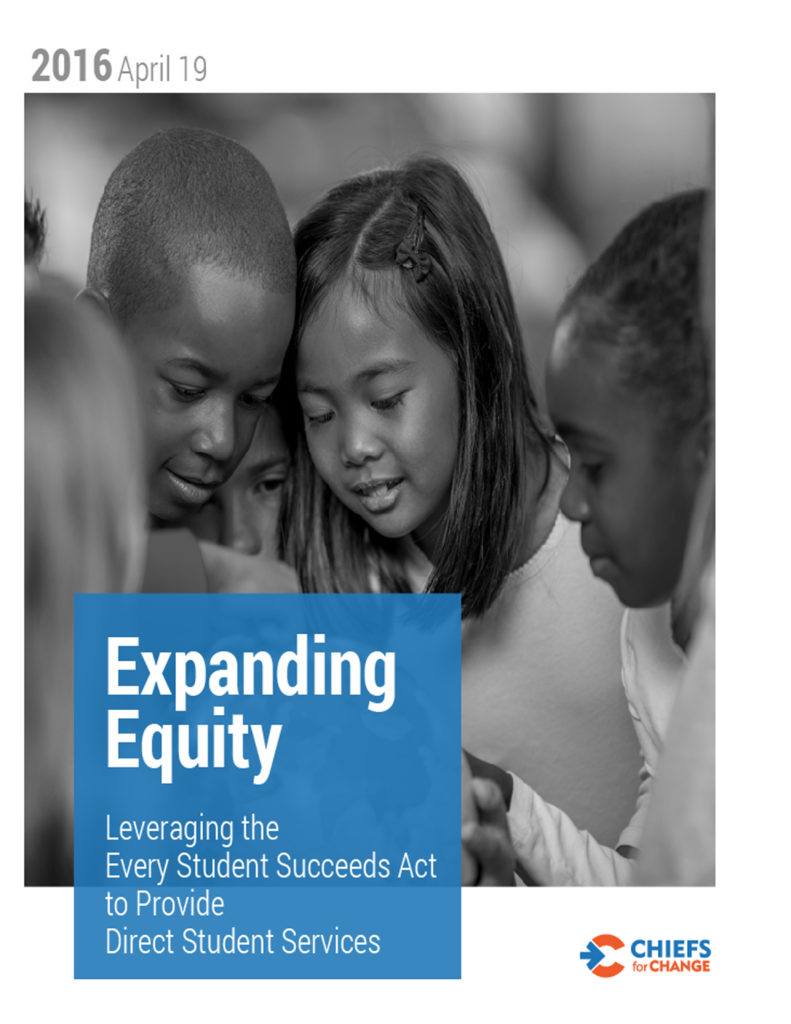
April 19, 2016
EXPANDING EQUITY
Leveraging the Every Student Succeeds Act to Provide Direct Student Services
The Every Student Succeeds Act (ESSA) includes a new innovative provision championed by Chiefs for Change enabling families of students who attend struggling schools to obtain Direct Student Services (DSS). These services encompass a wide range of individualized academic opportunities and build upon efforts several states have taken in recent years to expand parental choice options as a way to improve student academic achievement. Direct Student Services may be supported through a 3% discretionary state reservation of Title I funding. While nearly all funds designated for DSS must be awarded to districts, states have the opportunity to play a large role in creating a broader vision for how these resources can help leverage efforts of districts to increase school success and improve student outcomes – bringing value to teachers, families, students, and taxpayers.
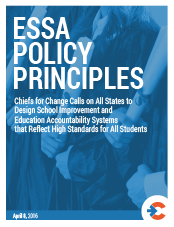
April 8, 2016
ESSA POLICY PRINCIPLES
Chiefs for Change Calls on All States to Design School Improvement and Education Accountability Systems That Reflect High Standards for All Students
The recent enactment of the Every Student Succeeds Act (ESSA) provides new opportunities for states to help shape future school systems. The next several months will be a critical time during which many states will begin the process of examining current accountability frameworks and making initial decisions in moving forward under ESSA. As these decisions are being made, Chiefs for Change recommends the following set of broad principles to ensure ESSA is a step forward, not a step back toward ensuring all students in this nation are provided the education they deserve.

March 22, 2016
DIVERSITY TO THE FOREFRONT
Why It Matters + Recommendations for System-Level Leaders
Despite our nation’s great diversity, the vast majority of system-level leaders in our school districts and state agencies remain white. This is especially troubling as research consistently illustrates the significant benefits of having a diverse teacher and leader workforce, and in particular individuals who share a similar race or ethnicity with the students and communities they serve. For example, increasing the diversity of the educator workforce at every level can build citizenship, provide role models and welcoming environments for students of color, encourage individuals to challenge the status quo, increase academic achievement, and shift teacher mindset and expectations.

